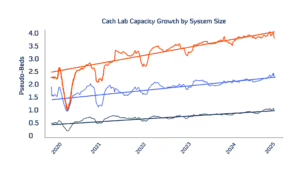New Capabilities Automatically Identify Patients for 10 High-Impact
Structural Heart and Heart Failure Clinical Trials
ALISO VIEJO, Calif. – July 1, 2025 – egnite, Inc., a leading cardiovascular digital health company announced the launch of the CardioCare Research Suite, a significant expansion of its flagship platform designed to streamline and enhance patient identification for clinical trials.
The Research Suite supports ten landmark clinical trials in structural heart and heart failure care, including AIM-HIGHer, ALT-FLOW II, APOLLO, ARTIST, CLASP IIF, CLASP II TR, CORCINCH-HF, EMPOWER, ENCIRCLE, PROGRESS.
This expansion addresses a long-standing challenge in clinical research, ensuring the right patients are surfaced at the right time for trial consideration. Through the use of AI and natural language processing to analyze both structured and unstructured hospital data, the CardioCare Research Suite empowers hospitals to expand access to novel therapies and reduce the operational burden on research teams.
Early adopters of the Research Suite have reported meaningful results:
- Over 50% of patients identified through the platform had never been seen by the principal investigator or a relevant specialist.
- 25%–50% of patient consents were sourced directly from CardioCare.
- Trial coordinators report significantly less time spent identifying candidates.
- The platform facilitates more precise, patient-focused outreach by trial investigators, addressing the complexity of evolving eligibility criteria.
“Since our inception, ambitious programs have expressed a desire to leverage the CardioCare platform to move from passive intake to proactive identification of clinical trial patients,” said Kahla Verhoef, Chief Operating Officer at egnite. “The Research Suite is a direct response to that need, empowering research teams to efficiently surface eligible patients from complex data, align with evolving trial criteria, and engage physicians with precision and confidence.”
egnite’s CardioCare Research Suite is now an available offering to all partner hospitals using the CardioCare platform. With the ability to leverage AI across structured and unstructured data, the platform uniquely equips research teams to accelerate enrollment and drive clinical innovation forward.
__
About egnite, Inc.
egnite is a data-driven digital health company committed to advancing the health of our society through innovative cardiovascular solutions. egnite utilizes AI algorithms and big data to generate business intelligence for healthcare, elevating the role of data in critical decisions. The company, based in Aliso Viejo, California, partners with leading hospitals and life sciences organizations to transform care delivery for cardiovascular patients. For more information, visit www.egnitehealth.com.
# # #
egnite, egnite, Inc., CardioCare and the spark logo are trademarks of egnite, Inc. All other trademarks are the property of their respective owners.
Media Contact
Torrey Loper
480-467-8685



